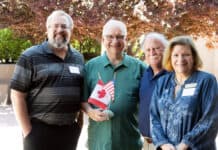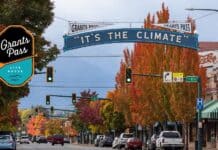After a blitz in coronavirus testing led to a commensurate increase in reported cases of the deadly virus in the Verde Valley, the area has seen its spread again level off.
As of press time on Friday, May 22, Yavapai County has a total of 283 confirmed cases, 116 of which resulted from a spread of asymptomatic cases at the Mingus Mountain Academy in Prescott Valley. The Verde Valley had a total of 53 cases, up 11 from the past week.
For the third week straight, Verde Valley Medical Center has had zero COVID-19 patients, after receiving negatives from the testing of 15 patients and ruling out the virus in six more.
The hospital, which has had no serious outbreak even as its sister hospital, Flagstaff Medical Center — also owned by Northern Arizona Healthcare — dealt with patients from the Navajo Nation, is heading toward resuming its elective surgeries, which Arizona Gov. Doug Ducey ordered to a halt at the outset of the pandemic in order to free up hospital space and resources for a potential COVID-19 outbreak. Ducey announced in late April that surgeries could resume May 1.
On Tuesday, May 26, Verde Valley Medical Center began its elective surgeries again, the beginning of a path toward something approaching normalcy.
“We think that that will be a cautious ramp up to ensure that we’re taking all the precautions we need to safeguard staff as well as patients and families,” VVMC Chief Administrative Officer Ron Haase said in a call with reporters on Thursday. “It also takes time to get surgeries back into the pipeline. The people that were scheduled or were going to be scheduled are now being notified that we are doing it again. We think it will take us a while to get back to normal, as much as a few weeks to as much as a month or more. One of the things we don’t know is what a new normal looks like. We know how many surgeries we typically had on a daily basis before and we’ll see if that ends up being how we operate in the future. I would say at least probably a couple more months before we’ll be back to what I would call being close to normal.”
As with most hospitals in America, charging for elective surgeries is the source of the hospital system’s regular revenues, and the drop in elective surgeries also meant a significant drop in revenues for the hospital system.
According to NAZ CEO Flo Spyrow, the hospital system received money from the Coronavirus Aid, Relief and Economic Security Act twice, both in the funding for all hospitals in the country and also from specific funding for hospitals having the largest COVID-19 outbreaks, as FMC did. However, even after that extra infusion of cash, administrators say that revenues dropped by 30%.
“Those payments, while we are thankful for them, are not putting us in a place where we would be if we had continued as normal,” Spyrow said.
Administrators remain unsure about the hospitals’ financial outlook in the future, noting as well that high levels of job losses could also mean loss of health insurance and difficulty for patients in paying for medical services.
With the crisis starting to abate in the area, medical staff are finding that their level of stress is starting to lessen as well.
“We’re optimistically cautious,” said Tyffany Laurano, interim chief nursing officer for FMC. “As the COVID volume is decreasing, mood is improving and we’re seeing an improvement in people’s overall well-being.”





















